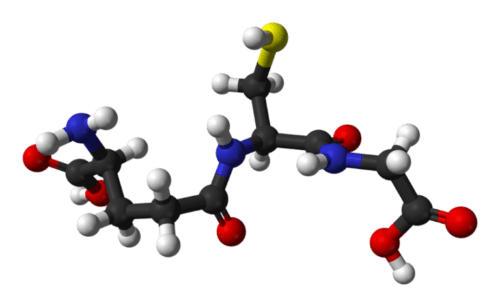Glutathione is a natural protein that protects cells, tissues and organs against disease, aging, and cancer. It consists of three amino acids: glycine, glutamate, and cysteine. The first two are easily and in sufficient quantity in the cells. On the other hand, the third, cysteine, is rarely found in food and, to add to the misfortune, the cooking of food denatures it, limiting all the more, the body’s ability to produce glutathione.
Glutathione is the main agent responsible for the health of the body: it acts as an antioxidant, it stimulates the immune system, it detoxifies, it energizes and it increases resistance to aging. This small protein, naturally produced by the body, maintains these vital protective functions. Your life depends on glutathione. Without it, your cells would disintegrate by uncontrolled oxidation, your body would have little resistance to bacteria, viruses, and cancers. Moreover, as if it were not enough, your liver would disintegrate and eventually die from an accumulation of toxins.
Each cell of the body is responsible for generating its own glutathione and must, therefore, have at its disposal the raw material necessary for its manufacture. Glutathione is still in high demand and is quickly consumed when we face all kinds of challenges: illness, stress, fatigue and even physical exercise. An exhaustive list of glutathione fields of action can be made:
Aging: It is well known that aging is accompanied by a precipitous drop in our glutathione levels. Low levels of glutathione are often found in many age-related diseases such as cataracts, Alzheimer’s disease, Parkinson’s disease, arteriosclerosis, and others.
Role of antioxidants: Important documentation exists supporting the role of antioxidants in the maintenance of good health and prevention of diseases. Glutathione is the major antioxidant in your cells.
Neurological problems: Low levels of glutathione are associated with some neurodegenerative disorders such as multiple sclerosis, Lou Gehrig’s disease, Alzheimer’s, Parkinson’s and others.
Cancer: Glutathione plays a role in the elimination of several carcinogens while maintaining the optimization of immune functions that make anti-tumor defenses more effective.
Athletics: Elevated glutathione levels increase strength and endurance. People interested in physical development realize that this can benefit their performance.
Toxins, pollution, and radiation: Glutathione detoxifies several pollutants, carcinogens, and poisons, including several listed in fuel exhausts and cigarette smoke. It delays the damage of radiation such as those encountered following the depletion of the ozone layer.
Heart disease and apoplexy, cholesterol: Elevated levels of glutathione combat the oxidation of fat in the bloodstream, including cholesterol, delaying the process of plaque formation in the arteries, the underlying cause of most heart problems.
Diabetes: Diabetics are more prone to infections and circulatory problems leading to heart problems, kidney damage, and blindness. Glutathione protects against complications related to diabetes.
Pulmonary diseases: Doctors use glutathione precursor drugs in a number of lung conditions, including asthma, chronic bronchitis, and emphysema. New therapeutic properties are highlighted for the damage caused by cigarette smoke, pulmonary fibrosis, and other diseases.
Digestive problems: Glutathione protects against inflammation in gastritis, stomach ulcers, pancreatitis and intestinal inflammation including colon ulcer and Crohn’s disease.
Hepatitis: The liver is the major storage organ of glutathione. Glutathione is deficient in alcoholic hepatitis as well as in cases of viral hepatitis including hepatitis A, B and C. Elevated glutathione levels restore liver function.
Renal problems: People with kidney injury or dialysis problems experience high levels of oxidation as a result of stress and decreased levels of glutathione. Elevated glutathione helps prevent anemia.
Pregnancy, breastfeeding, and childbirth: The role of glutathione in the development of the fetus and placenta is crucial. It works in the placenta to detoxify pollutants before they reach the developing child. Several complications during pregnancy have been linked to poor levels of glutathione.
So why is Glutathione found in so many skin products and what effects does it have on the skin? Find out in our next post.


